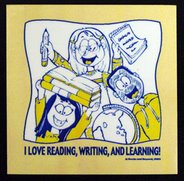About NP, Lecture Listening and Note Making, and College Thinking
Ken Enochs, April 11 & 17, 2006
I. Hello!
A. Intro of lecturer(s)
B. NP policies, grades, attendance
Essential NP Policies
|
II. Purpose of Lectures & NP
A. Provide information related to content topics
1. Introduce ARW and/or RCA readings (often the first NP on a topic)
2. Link readings & ARW/RCA classes
3. Give additional info on topic—info not in readings
4. Stimulate your intellect
B. Preparation for lecture-style courses in major
-
Note-making
-
Listening to different types of English
-
Asking questions in a large group
III. Tapes of NP
A. Can listen/copy in ILC Office (I–212)
B. Bring _______________ & _______________ min. tape
IV. Lecture Activities: Active or Passive?
| Activity | Active | Passive |
| 1. Copying down what you see on the board or screen. | | |
| 2. Writing things down that the lecturer says. | | |
| 3. Writing down your own thoughts and ideas. | | |
| 4. Asking the lecturer questions. | | |
| 5. Asking yourself questions–jotting them down so you can research the answers later. | | |
| 6. Answering question posed by the lecturer. | | |
| 7. Doing calculations, solving problems, and so on. | | |
| 8. Yawning, shuffling, fidgeting, staring out of the window (if there is one), watching other students, chatting with them, talking to yourself. | | |
| 9. Thinking about what you will be doing later on. | | |
| 10. Looking at the lecturer, the blackboard, or the screen. | | |
| 11. Discussing things with students near to you, when directed to do so by the lecturer. | | |
V. Listening & Making Notes
VI. Symbols and Suggestions for Abbreviations
1. Symbols (ALN: Learn to Listen; Listen to Learn)
| = equals | ~ about | > is more than |
| = does not = | / per | < is less than |
| go up, increase | therefore | 1990~ since 1990 |
| go down, decrease | because | ~ 1990 before 1990 |
| w/ with | man/men | & and |
| w/o without | woman/women | vs against |
2. Leave out the periods in standard abbreviations.
for example ___ compare ___
department ___ New York City ___
3. Use only the first syllable of a word.
student ___ college ___
4. Use the entire first syllable and only the first letter of a second syllable.
subject ___ individual ___
5. Cut final letters. Use just enough from the start of a word to make an abbreviation that is easy to understand and remember.
information ___ introduction ___
chemistry ___ maximum ___
6. Cut vowels from the middle of words, and keep only enough consonants to provide a recognizable skeleton of the word.
background ___ problem ___
7. Use an apostrophe.
government ___ amount ___
continued ___
8. Make plurals by adding an "s."
pages ___ chapters ___
9. Use "g" to represent "ing" endings.
checking ___ experimenting ___
10. Short words should usually be spelled out: in, at (@), to, but, for, key.
11. Leave out unimportant verbs and the words "a" and "the."
13. If a term, phrase, or name is first written out in full during the lecture, initials can be substituted when the term, phrase, or name is used again.
College Thinking CT
VII. College Thinking
VIII. Quiz for this NP Lecture (answer on your computer card)
1. Which of the following is an active learning activity?
a. Copying down what is written on the board
b. Writing down what the lecturer says.
c. Writing down your own thoughts and ideas.
d. Looking at the lecturer or the blackboard.
2. Which of the following is false?
a. Neither the lecturer nor ELP Office will accept late computer cards.
b. Handouts and computer cards can be picked up at any of the four doors.
c. Questions about NP should be directed to the lecturer or NP Coordinator.
d. The punishment for cheating on NP computer cards is very serious.
3. How much homework is required for NP class?
a. Some reading b. Some worksheets
c. None d. Every week is different
4. How much does it cost to copy an NP tape in the ILC office?
a. 50 yen b. 100 yen
c. 200 yen d. It's free
5. What should be the primary work of college students (according to Meiland's College Thinking)?
a. Critically examine and evaluate reasons for beliefs.
b. Memorize the most complex facts of human knowledge.
c. Learn the truth according to current human knowledge.
d. Attend all classes and complete all assignments on time.

No comments:
Post a Comment